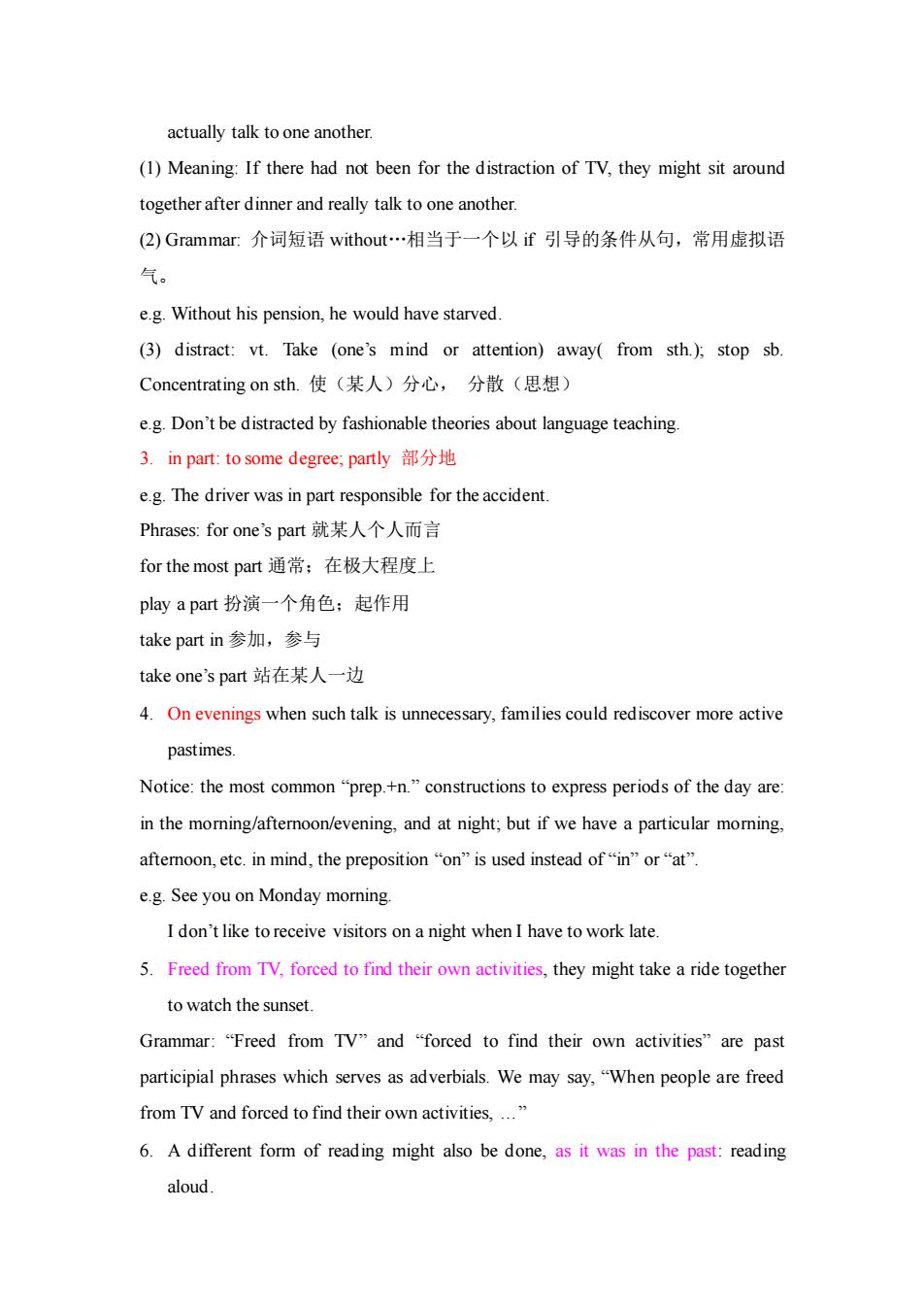正在加载图片...

actually talk to one another. (1)Meaning:If there had not been for the distraction of TV,they might sit around together after dinner and really talk to one another (2)Grammar:.介词短语without.…相当于一个以f引导的条件从句,常用虚拟语 气。 e.g.Without his pension,he would have starved. (3)distract:vt.Take (one's mind or attention)away(from sth.),stop sb. Concentrating on sth..使(某人)分心,分散(思想) e.g.Don't be distracted by fashionable theories about language teaching 3.in part:to some degree;partly部分地 e.g.The driver was in part responsible for the accident Phrases::for one's part就某人个人而言 for the most part通常:在极大程度上 play a part扮演一个角色:起作用 take part in参加,参与 take one's part站在某人一边 4.On evenings when such talk is unnecessary,families could rediscover more active pastimes. Notice:the most common"prep.+n."constructions to express periods of the day are: in the moming/afteroon/evening,and at night;but if we have a particular moming. aftemoon,etc.in mind,the preposition“on”is used instead of“in”or“at' e.g.See you on Monday morning. I don't like to receive visitors on a night when I have to work late. 5.Freed from TV,forced to find their own activities,they might take a ride together to watch the sunset. Grammar:"Freed from TV"and "forced to find their own activities"are past participial phrases which serves as adverbials.We may say,"When people are freed from TV and forced to find their own activities,..." 6.A different form of reading might also be done,as it was in the past:reading aloud.actually talk to one another. (1) Meaning: If there had not been for the distraction of TV, they might sit around together after dinner and really talk to one another. (2) Grammar: 介词短语 without…相当于一个以 if 引导的条件从句,常用虚拟语 气。 e.g. Without his pension, he would have starved. (3) distract: vt. Take (one’s mind or attention) away( from sth.); stop sb. Concentrating on sth. 使(某人)分心, 分散(思想) e.g. Don’t be distracted by fashionable theories about language teaching. 3. in part: to some degree; partly 部分地 e.g. The driver was in part responsible for the accident. Phrases: for one’s part 就某人个人而言 for the most part 通常;在极大程度上 play a part 扮演一个角色;起作用 take part in 参加,参与 take one’s part 站在某人一边 4. On evenings when such talk is unnecessary, families could rediscover more active pastimes. Notice: the most common “prep.+n.” constructions to express periods of the day are: in the morning/afternoon/evening, and at night; but if we have a particular morning, afternoon, etc. in mind, the preposition “on” is used instead of “in” or “at”. e.g. See you on Monday morning. I don’t like to receive visitors on a night when I have to work late. 5. Freed from TV, forced to find their own activities, they might take a ride together to watch the sunset. Grammar: “Freed from TV” and “forced to find their own activities” are past participial phrases which serves as adverbials. We may say, “When people are freed from TV and forced to find their own activities, …” 6. A different form of reading might also be done, as it was in the past: reading aloud